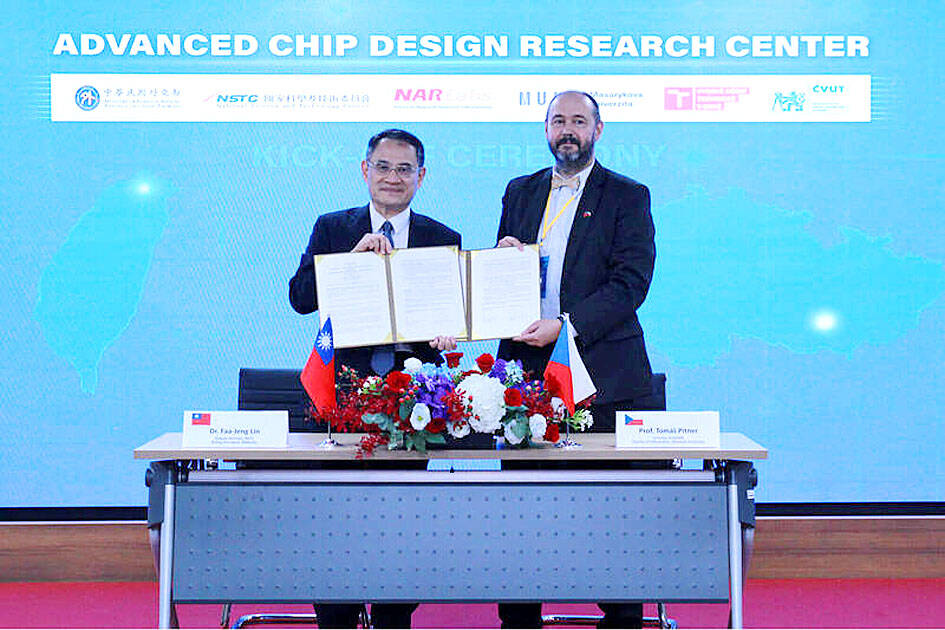The Advanced Chip Design Research Center (ACDRC) established under supervision of the Taiwan-Czech Republic supply chain resilience program is to unveil its plaque next month, the Ministry of Foreign Affairs said.
Taiwan has launched a collaborative program to enhance the supply chain resilience and capabilities of the democratic partnership with the Czech Republic.
The program began last year and is to run until 2027, and has four major projects, the ministry said.

Photo: Taipei Times file
First, the ACDRC is to be set up in the Czech Republic to help develop chip design ability and talent, it said.
A cooperative agreement for the center has been signed by both sides, with a launching ceremony held in June and a plaque-unveiling ceremony to take place next month, the ministry added.
The ACDRC is part of the Taiwan-Czech Republic resilience program led by the ministry and is different from the Taiwan Chip-based Industrial Innovation Program headed by the National Science and Technology Council, the ministry said.
Second is the Supply Chain Resilience Center (SCRC), which was built at Charles University in Prague, it said, adding that the university and National Chengchi University have signed a cooperative agreement.
Taiwan and the Czech Republic would jointly research supply chain trade, investment and technical collaboration, publish their results via the SCRC and are to hold a seminar by the end of this year, the ministry said.
Third is the Scholarship for Mastery of Strategic Key Technologies (SMSKT), which is awarded to Czech students so they can learn about the semiconductor industry, it said.
The SMSKT has been ongoing for two years and has funded 56 Czech students who took short-term training and degree courses in Taiwan, with the goal of boosting critical technology areas for the Czech semiconductor sector and nurturing local talent for Taiwanese companies investing in the Czech Republic, the ministry said.
Last is the Business Opportunities Enhancement Program (BOEP), which has enabled the establishment of the Czech Centre Taipei to promote bilateral trade and cultural exchanges, it said.
The Czech Centre Taipei aims to increase Taiwanese’s understanding of Czech industries, education, cultures and tourism, and attract Taiwanese investment to the Central European country, the ministry said, adding that the center opened on June 4.
CzechInvest, the Business and Investment Development Agency of the Czech government, has also said it would set up an overseas office in Taiwan under the BOEP.
Meanwhile, the ministry said it has been working with the Slovakian government in the semiconductor field to build a laboratory for vehicle power modules, develop gallium nitride and gallium oxide semiconductors for vehicle use, and introduce drive system designs for electric vehicles.
The collective research-and-development outcomes are expected to help Taiwanese industries integrate into the European automobile supply chain through exchanges of semiconductor technology, it said.
Taiwan has also been assisting the Republic of Lithuania in constructing a semiconductor design center, a 200mm wafer factory, and a wafer assembly and test factory, among others, the ministry said.
By bolstering Lithuania’s ability to design and manufacture semiconductors, the semiconductor industry would have a Baltic ecosystem which would favor Taiwanese industrial supply chains and technical consulting services, it said.

Taiwan has received more than US$70 million in royalties as of the end of last year from developing the F-16V jet as countries worldwide purchase or upgrade to this popular model, government and military officials said on Saturday. Taiwan funded the development of the F-16V jet and ended up the sole investor as other countries withdrew from the program. Now the F-16V is increasingly popular and countries must pay Taiwan a percentage in royalties when they purchase new F-16V aircraft or upgrade older F-16 models. The next five years are expected to be the peak for these royalties, with Taiwan potentially earning

STAY IN YOUR LANE: As the US and Israel attack Iran, the ministry has warned China not to overstep by including Taiwanese citizens in its evacuation orders The Ministry of Foreign Affairs (MOFA) yesterday rebuked a statement by China’s embassy in Israel that it would evacuate Taiwanese holders of Chinese travel documents from Israel amid the latter’s escalating conflict with Iran. Tensions have risen across the Middle East in the wake of US and Israeli airstrikes on Iran beginning Saturday. China subsequently issued an evacuation notice for its citizens. In a news release, the Chinese embassy in Israel said holders of “Taiwan compatriot permits (台胞證)” issued to Taiwanese nationals by Chinese authorities for travel to China — could register for evacuation to Egypt. In Taipei, the ministry yesterday said Taiwan

Taiwan is awaiting official notification from the US regarding the status of the Agreement on Reciprocal Trade (ART) after the US Supreme Court ruled US President Donald Trump's global tariffs unconstitutional. Speaking to reporters before a legislative hearing today, Premier Cho Jung-tai (卓榮泰) said that Taiwan's negotiation team remains focused on ensuring that the bilateral trade deal remains intact despite the legal challenge to Trump's tariff policy. "The US has pledged to notify its trade partners once the subsequent administrative and legal processes are finalized, and that certainly includes Taiwan," Cho said when asked about opposition parties’ doubts that the ART was

If China chose to invade Taiwan tomorrow, it would only have to sever three undersea fiber-optic cable clusters to cause a data blackout, Jason Hsu (許毓仁), a senior fellow at the Hudson Institute and former Chinese Nationalist Party (KMT) legislator, told a US security panel yesterday. In a Taiwan contingency, cable disruption would be one of the earliest preinvasion actions and the signal that escalation had begun, he said, adding that Taiwan’s current cable repair capabilities are insufficient. The US-China Economic and Security Review Commission (USCC) yesterday held a hearing on US-China Competition Under the Sea, with Hsu speaking on